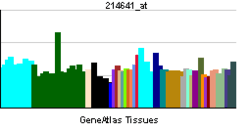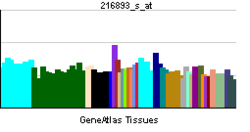Collagen, type IV, alpha 3
| View/Edit Human | View/Edit Mouse |
Collagen alpha-3(IV) chain is a protein that in humans is encoded by the COL4A3 gene.[3][4]
Type IV collagen, the major structural component of basement membranes, is a multimeric protein composed of 3 alpha subunits. These subunits are encoded by 6 different genes, alpha 1 through alpha 6, each of which can form a triple helix structure with 2 other subunits to form type IV collagen. This gene encodes alpha 3. In Goodpasture's syndrome, autoantibodies bind to the collagen molecules in the basement membranes of alveoli and glomeruli. The epitopes that elicit these autoantibodies are localized largely to the non-collagenous C-terminal domain of the protein. A specific kinase phosphorylates amino acids in this same C-terminal region and the expression of this kinase is upregulated during pathogenesis. There are multiple alternate transcripts that appear to be unique to this human alpha 3 gene and alternate splicing is restricted to the six exons that encode this C-terminal domain. This gene is also linked to an autosomal recessive form of Alport syndrome. The mutations contributing to this syndrome are also located within the exons that encode this C-terminal region. Like the other members of the type IV collagen gene family, this gene is organized in a head-to-head conformation with another type IV collagen gene so that each gene pair shares a common promoter. Some exons of this gene are interspersed with exons of an uncharacterized gene which is on the opposite strand.[4]
Disease Database
LOVD Alport gene variant databases (COL4A3, COL4A4, COL4A5)
References
- ↑ "Human PubMed Reference:".
- ↑ "Mouse PubMed Reference:".
- ↑ Turner N, Mason PJ, Brown R, Fox M, Povey S, Rees A, Pusey CD (Mar 1992). "Molecular cloning of the human Goodpasture antigen demonstrates it to be the alpha 3 chain of type IV collagen". J Clin Invest. 89 (2): 592–601. doi:10.1172/JCI115625. PMC 442892
 . PMID 1737849.
. PMID 1737849. - 1 2 "Entrez Gene: COL4A3 collagen, type IV, alpha 3 (Goodpasture antigen)".
Further reading
- Hinek A (1995). "Nature and the multiple functions of the 67-kD elastin-/laminin binding protein.". Cell Adhes. Commun. 2 (3): 185–93. doi:10.3109/15419069409004436. PMID 7827955.
- Ständer M, Naumann U, Wick W, Weller M (1999). "Transforming growth factor-beta and p-21: multiple molecular targets of decorin-mediated suppression of neoplastic growth.". Cell Tissue Res. 296 (2): 221–7. doi:10.1007/s004410051283. PMID 10382266.
- Kurpakus Wheater M, Kernacki KA, Hazlett LD (1999). "Corneal cell proteins and ocular surface pathology.". Biotechnic & Histochemistry. 74 (3): 146–59. doi:10.3109/10520299909047967. PMID 10416788.
- Pescucci C, Longo I, Bruttini M, et al. (2003). "Type-IV collagen related diseases.". J. Nephrol. 16 (2): 314–6. PMID 12768082.
- Torra R, Tazón-Vega B, Ars E, Ballarín J (2005). "Collagen type IV (alpha3-alpha4) nephropathy: from isolated haematuria to renal failure.". Nephrol. Dial. Transplant. 19 (10): 2429–32. doi:10.1093/ndt/gfh435. PMID 15280517.
- Rana K, Wang YY, Buzza M, et al. (2005). "The genetics of thin basement membrane nephropathy.". Semin. Nephrol. 25 (3): 163–70. doi:10.1016/j.semnephrol.2005.01.008. PMID 15880327.
- Maziers N, Dahan K, Pirson Y (2006). "[From Alport syndrome to benign familial hematuria: clinical and genetic aspect]". Nephrol. Ther. 1 (2): 90–100. doi:10.1016/j.nephro.2005.03.005. PMID 16895672.
- Ghebrehiwet B, Peerschke EI, Hong Y, et al. (1992). "Short amino acid sequences derived from C1q receptor (C1q-R) show homology with the alpha chains of fibronectin and vitronectin receptors and collagen type IV.". J. Leukoc. Biol. 51 (6): 546–56. PMID 1377218.
- Quinones S, Bernal D, García-Sogo M, et al. (1992). "Exon/intron structure of the human alpha 3(IV) gene encompassing the Goodpasture antigen (alpha 3(IV)NC1). Identification of a potentially antigenic region at the triple helix/NC1 domain junction.". J. Biol. Chem. 267 (28): 19780–4. PMID 1400291.
- Gupta S, Batchu RB, Datta K (1992). "Purification, partial characterization of rat kidney hyaluronic acid binding protein and its localization on the cell surface.". Eur. J. Cell Biol. 56 (1): 58–67. PMID 1724753.
- Morrison KE, Mariyama M, Yang-Feng TL, Reeders ST (1991). "Sequence and localization of a partial cDNA encoding the human alpha 3 chain of type IV collagen.". Am. J. Hum. Genet. 49 (3): 545–54. PMC 1683122
 . PMID 1882840.
. PMID 1882840. - Hernandez MR, Igoe F, Neufeld AH (1986). "Extracellular matrix of the human optic nerve head.". Am. J. Ophthalmol. 102 (2): 139–48. doi:10.1016/0002-9394(86)90134-0. PMID 2426947.
- Griffin CA, Emanuel BS, Hansen JR, et al. (1987). "Human collagen genes encoding basement membrane alpha 1 (IV) and alpha 2 (IV) chains map to the distal long arm of chromosome 13.". Proc. Natl. Acad. Sci. U.S.A. 84 (2): 512–6. doi:10.1073/pnas.84.2.512. PMC 304239
 . PMID 3025878.
. PMID 3025878. - Murata K, Motayama T, Kotake C (1986). "Collagen types in various layers of the human aorta and their changes with the atherosclerotic process.". Atherosclerosis. 60 (3): 251–62. doi:10.1016/0021-9150(86)90172-3. PMID 3089234.
- Glant TT, Hadházy C, Mikecz K, Sipos A (1985). "Appearance and persistence of fibronectin in cartilage. Specific interaction of fibronectin with collagen type II.". Histochemistry. 82 (2): 149–58. doi:10.1007/bf00708199. PMID 3997552.
- Uscanga L, Kennedy RH, Stocker S, et al. (1984). "Immunolocalization of collagen types, laminin and fibronectin in the normal human pancreas.". Digestion. 30 (3): 158–64. doi:10.1159/000199100. PMID 6389236.
- Sundarraj N, Willson J (1982). "Monoclonal antibody to human basement membrane collagen type IV.". Immunology. 47 (1): 133–40. PMC 1555500
 . PMID 6811420.
. PMID 6811420. - Hahn E, Wick G, Pencev D, Timpl R (1980). "Distribution of basement membrane proteins in normal and fibrotic human liver: collagen type IV, laminin, and fibronectin.". Gut. 21 (1): 63–71. doi:10.1136/gut.21.1.63. PMC 1419572
 . PMID 6988303.
. PMID 6988303. - Singhal PC, Sharma P, Garg P (1996). "HIV-1 gp160 protein-macrophage interactions modulate mesangial cell proliferation and matrix synthesis.". Am. J. Pathol. 147 (6): 1780–9. PMC 1869951
 . PMID 7495302.
. PMID 7495302.


